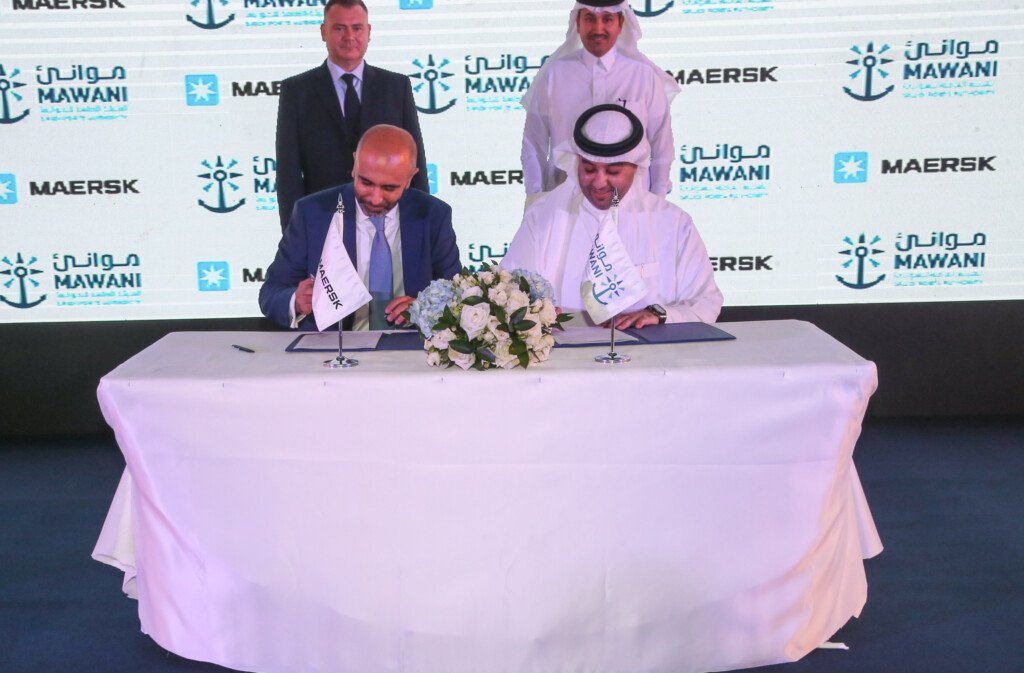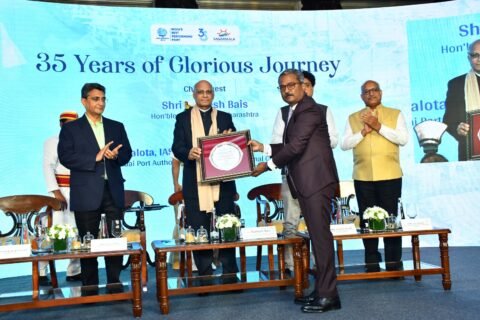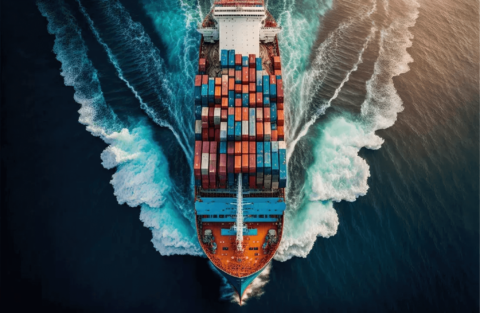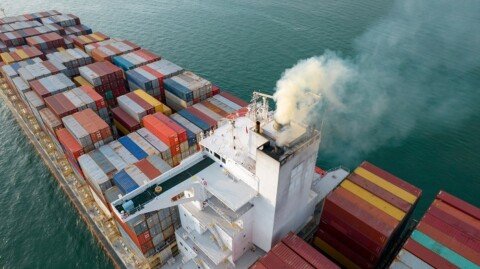A. P. Moller – Maersk, global integrator of container logistics, today signed an agreement with Saudi Ports Authority “Mawani” committing to an investment of 136Million USD (510 million Saudi Riyals) over a period of 25 years to set up an Integrated Logistics Park at the Jeddah Islamic Port in Saudi Arabia.
The agreement was signed in the presence of His Excellency the Minister of Transport and Logistics, Chairman of the Board of Directors of the Authority, Engineer Saleh bin Nasser Al-Jasser, Richard Morgan, Managing Director Maersk West & Central Asia, and several officials of related sectors. The agreement was signed by His Excellency the President of the Saudi Ports Authority, Mr. Omar bin Talal Hariri, and the Managing Director of Maersk Saudi Arabia, Mr. Mohammad Shihab.
The greenfield project spread over an area of 205,000 sq. m. will be the first of its kind at the Jeddah Islamic Port offering an array of solutions with an aim to connect and simplify the supply chains of importers and exporters in the Kingdom. Maersk will also be investing heavily in renewable energy to power this facility and eventually achieve carbon-neutrality. The project is expected to create more than 2,500 direct and indirect jobs in Saudi Arabia.
A vision for the future
Saudi Arabia’s Vision 2030 lays great importance in capitalising the Kingdom’s strategic location to build its role as an integral driver of international trade connecting the continents of Africa, Asia and Europe. Vision 2030 aims at more than tripling the share of non-oil exports from Saudi Arabia from its current levels to reach 50% of its total exports. It aims at substantially raising the Kingdom’s global ranking to top 25 in Logistics Performance Index to ensure that Saudi Arabia becomes the regional leader in logistics.
Commenting on the signing of the agreement, His Excellency the Minister of Transport, Engineer Saleh bin Nasser Al-Jasser, said, “We are pleased today by the signing of this agreement, which will be a remarkable milestone in strengthening the Kingdom’s position regionally and globally and will contribute to transforming the Kingdom into a leading global center in the field of transportation and logistics services.” He added, “The authority’s new strategy supports the maritime transport journey in the Kingdom and enables the authority to continue developing a sustainable and prosperous maritime transport system that supports the Kingdom’s social and economic ambitions and contributes to achieving the ambitious goals of Vision 2030.”
Richard Morgan, Managing Director, Maersk West & Central Asia said, “We are building an innovative, digital and technologically-advanced logistics infrastructure on the foundations of our strong network of global shipping and logistics & services to create value for customers in the region. Our ambition is not only to connect and simplify our customers’ supply chains, but also be a catalyst in the growth of trade and economies through our customer-centric solutions”.
His Excellency the President of the Saudi Ports Authority, Mr. Omar bin Talal Hariri said, “The strategic partnership between the authority and Maersk is an important step to achieve our ambition for Jeddah Islamic Port to become among the top ten ports in the world by 2030, with the volume of container handling reaching 18 million TEUs. I am confident that this partnership will greatly enhance the distinguished operational capabilities of Jeddah Islamic Port, which ranks first among the Red Sea ports, with its strategic location on the Red Sea coast linking the international shipping route between East and West.”.
Strategic Location
Saudi Arabia’s Jeddah Islamic Port sits strategically on the Red Sea Coast connecting the international shipping route between the east and the west. With over 5 million Twenty-feet Equivalent Units (TEUs) of containers flowing in and out of Jeddah Islamic Port, it is the largest port in terms of volume and cargo handling in Saudi Arabia and second largest in GCC (Gulf Cooperation Council) countries. Over 2.5 million TEUs tranship through the Jeddah Islamic Port every year. The port also connects to hinterland through a strong road and rail network.
A truly integrated logistics solution for all
The bonded and non-bonded warehousing & distribution (W&D) facility will cover more than 70% of the total area while the remaining part will act as a hub for transhipment, air freight and LCL cargo. The W&D part will have several different sections to accommodate general warehousing (food & beverages, furniture, automobiles, chemicals, textile & apparel and machinery, appliances & electronics) and cold chain storage (fruits & vegetables, protein and confectionary & consumables). To cater to the rapid penetration of eCommerce in Saudi Arabia, the facility will also have a dedicated eCommerce fulfilment centre. The Integrated Logistics Park will be able to handle annual volumes close to 200,000 TEUs across different products.
“The vision for the Kingdom to diversify its economy beyond the oil sector is an important one to enable long term growth for Saudi Arabia. At Maersk, we not only believe in this vision, but are also committed to play a role by upgrading the logistics infrastructure through our integrated offering and thus opening more avenues for traders in Saudi Arabia”, said Mohamad Shihab, Managing Director, Maersk Saudi Arabia.
Future-proofing through advanced technology and renewable power
Maersk will deploy state-of-the-art warehouse management system that implements modern technologies and digital solutions for efficient inventory management, track & trace at unit-level and offers rich dashboards for higher visibility and deeper insights. These systems will help in improving efficiencies and build a cost competitive edge for Maersk’s customers.
Maersk is also charting its path to make the facility carbon-neutral eventually. The warehouses, cold storages and office building will all be powered with renewable solar energy. Even the yard machinery including forklifts, reach stackers, empty container handlers, trucks and other vehicles deployed for the movement of cargo will be electric.







